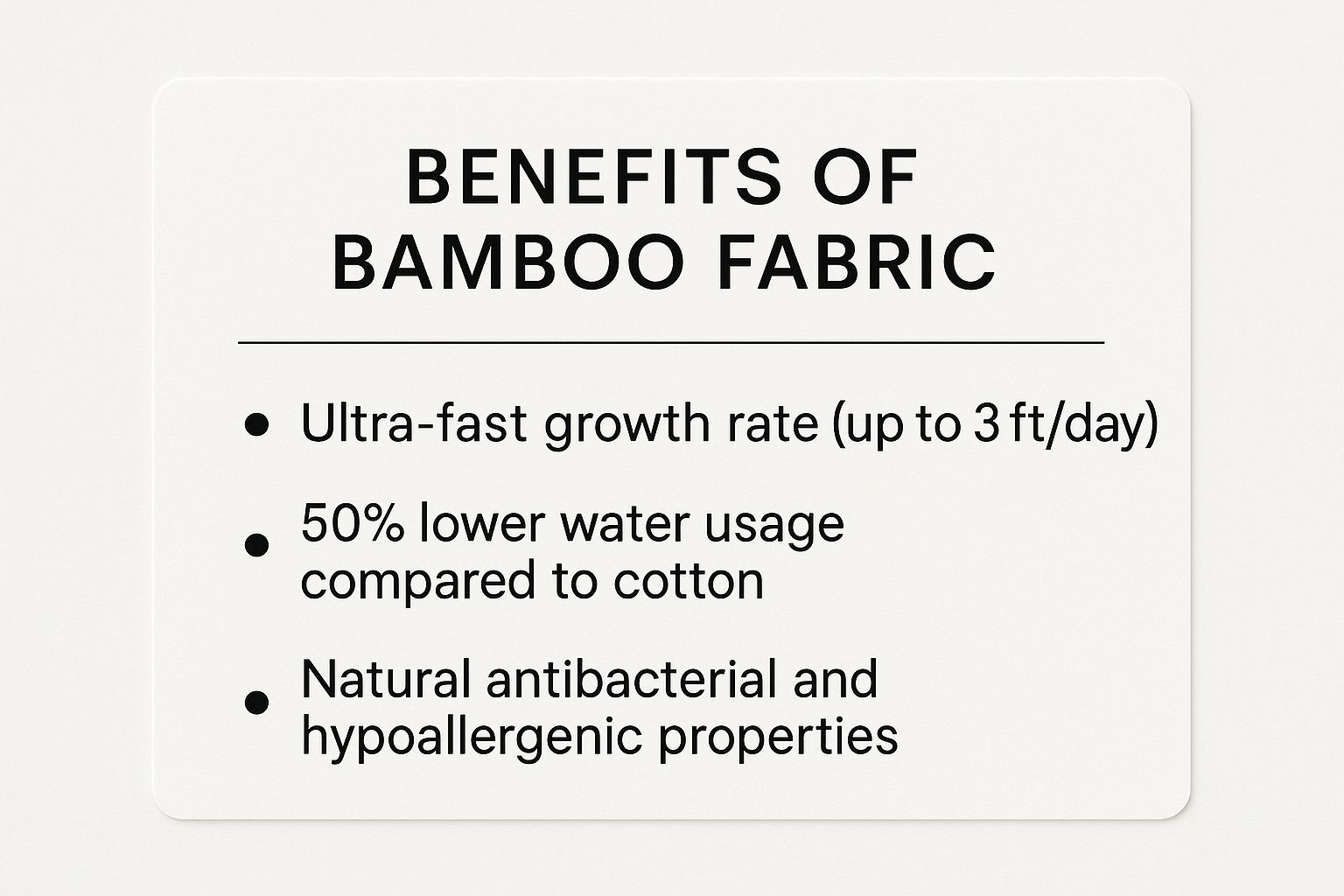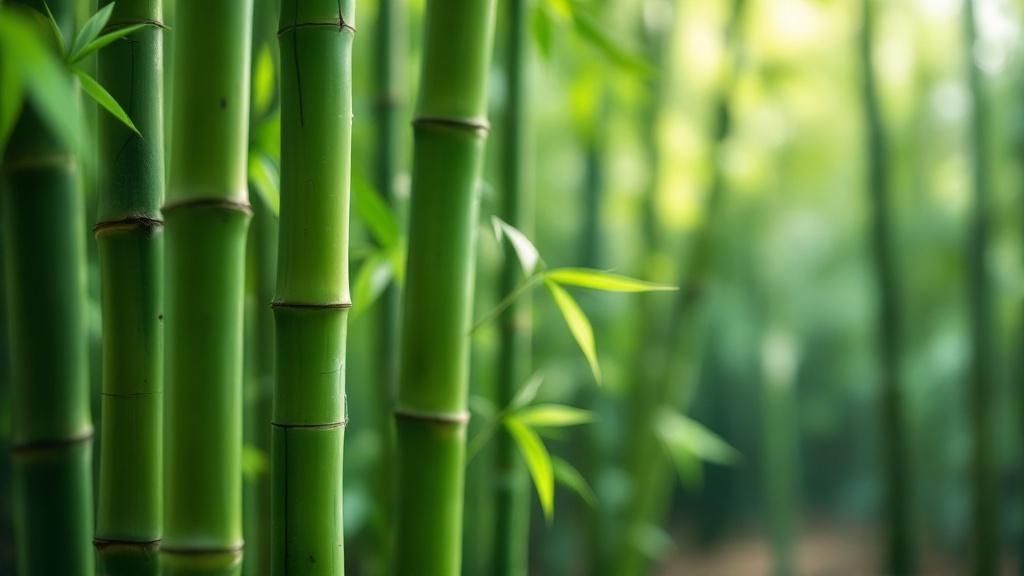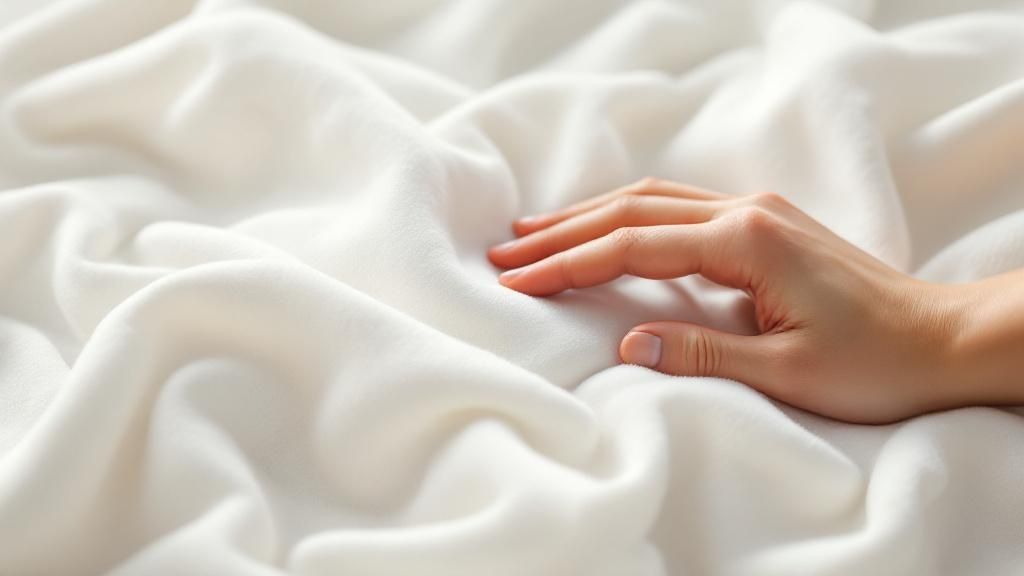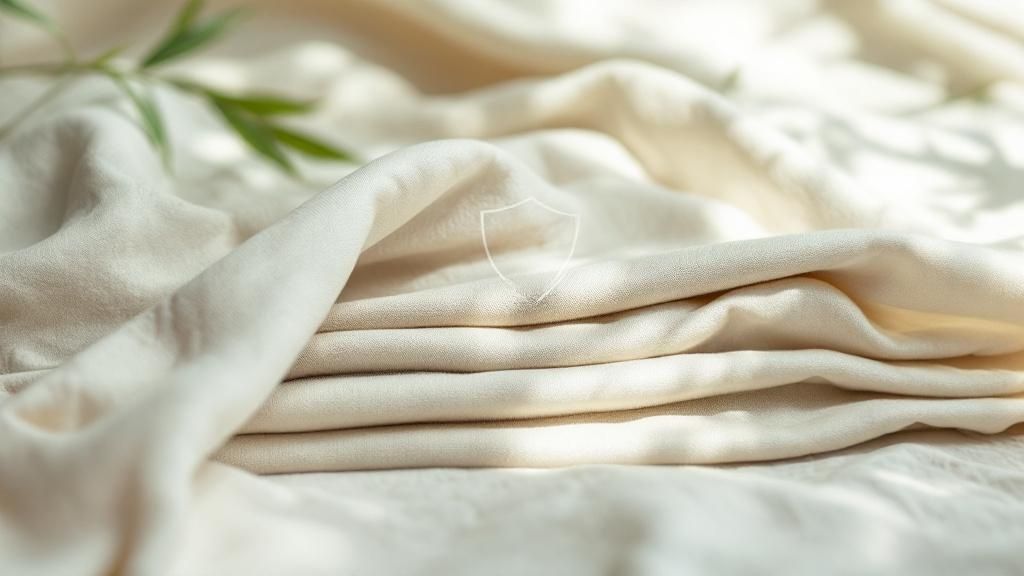Have you ever wondered what makes bamboo fabric so special? It’s not just about how incredibly soft it feels—though that’s a huge part of it. The real magic lies in its unique blend of luxurious comfort, hypoallergenic properties, and impressive environmental benefits. This combination is precisely why bamboo has moved from a niche material to a mainstream favorite for everything from cozy t-shirts to high-end bedding.
So, Why Is Everyone Talking About Bamboo Fabric?
It’s true, bamboo textiles are everywhere these days. But this isn't just a fleeting trend. The shift is being driven by people like you and me who want products that not only feel amazing but also align with a more sustainable lifestyle. We're all becoming more conscious of our choices, and bamboo fits the bill perfectly.
On a personal level, the comfort is undeniable. Bamboo fibers are naturally round and smooth, which means they create a fabric that glides against your skin without any of the scratchiness you might get from other materials. This makes it a fantastic option for anyone with sensitive skin or conditions like eczema. But beyond its gentle touch, bamboo fabric is a true performance powerhouse.
This image really captures the core reasons bamboo stands out from the crowd.

As you can see, from how it's grown to how it performs, bamboo has some clear advantages over more conventional fabrics.
A Head-to-Head Comparison: Bamboo vs. Cotton
For decades, cotton has been the go-to for soft, natural textiles. We all grew up with it. But when you put bamboo side-by-side with traditional cotton, you start to see why so many people are making the switch. The differences are pretty stark, especially when it comes to sustainability and feel.
If you're particularly curious about how this plays out in the bedroom, you can explore the 20 reasons bamboo sheets are better for getting a great night's sleep.
To make things simple, let's break down the key differences in a quick comparison.
Bamboo Fabric vs Cotton at a Glance
This table gives a straightforward look at how bamboo fabric stacks up against traditional cotton, highlighting the key features that matter most.
| Feature | Bamboo Fabric | Traditional Cotton |
|---|---|---|
| Water Usage | Requires significantly less water to grow. | High water consumption, often needing extensive irrigation. |
| Softness | Exceptionally soft and silky, often compared to cashmere. | Can be soft, but quality varies greatly and can be coarse. |
| Sustainability | A fast-growing grass that requires no pesticides or fertilizers. | Often requires heavy use of pesticides and chemical treatments. |
| Breathability | Highly breathable and moisture-wicking; great for thermoregulation. | Breathable, but tends to retain moisture longer. |
Ultimately, while cotton has been a reliable staple, bamboo offers a modern alternative that excels in softness, performance, and eco-friendliness, making it a compelling choice for today's conscious consumer.
The Unmatched Comfort of Bamboo Textiles
If there's one thing that gets people hooked on bamboo fabric, it's the incredible feeling against their skin. It’s a softness you really have to feel to believe. Imagine the delicate touch of silk blended with the cozy warmth of high-end cashmere—that’s the closest I can get to describing it. This luxurious sensation is one of the biggest draws of bamboo.
This isn't just a perception of softness; it's baked into the material's DNA. Under a microscope, you'd see that bamboo fibers are naturally round and smooth. They don't have the rough, jagged edges you might find in wool or even certain types of cotton, which means there’s far less friction against your skin.
For anyone dealing with sensitive skin or conditions like eczema, this is a huge deal. The fabric glides instead of chafing, which helps cut down on irritation, redness, and general discomfort.
Key Insight: The secret to bamboo's gentle, non-irritating feel lies in its naturally round and smooth fibers. This makes it an amazing choice for anything that sits directly against your skin, from clothing to bedding.

This unique structure also leads to another quality that people absolutely love.
How Bamboo Creates a Flattering Drape
Bamboo fabric doesn't just feel soft—it drapes beautifully. What I mean by that is it hangs and flows in a way that’s both elegant and incredibly comfortable. Picture a flowing dress that moves as you do, or loungewear that settles in cozily without clinging in all the wrong spots. It’s this quality that makes bamboo clothing so flattering for different body types.
This natural drape makes bamboo a fantastic and versatile pick for all sorts of apparel. I see it used most effectively in:
- Flowy dresses and skirts that have a graceful movement.
- Loungewear and pajamas that feel liberatingly comfortable.
- Stylish tops and blouses that look polished but feel completely relaxed.
When you combine that silky feel, gentle touch, and elegant drape, you get a level of comfort that's genuinely unique to bamboo. It’s a material that truly delivers on both luxury and everyday practicality, which explains why it's become a go-to for anyone who prioritizes comfort.
How Bamboo Fabric Supports Healthier Skin
It's one thing for a fabric to feel soft, but it's another for it to actively improve the health of your skin. That's where bamboo really shines. Beyond its luxurious feel, bamboo's natural properties create an environment where your skin can thrive, making it a fantastic choice for everything from your t-shirts to your bedsheets.
Gentle on Sensitive Skin
If you have sensitive skin, eczema, or are prone to contact allergies, you know how irritating some fabrics can be. Wool and even some rougher cottons have tiny, abrasive fibers that can catch and chafe. Bamboo is different. Its fibers are naturally smooth and round, meaning they glide across your skin without causing friction. It's a difference you can feel immediately.

This gentle touch is supercharged by bamboo's incredible moisture-wicking power. It can absorb far more moisture than cotton, pulling sweat away from your skin in an instant. Whether you're in the middle of a workout or just trying to sleep through a humid night, bamboo keeps you dry. This drastically cuts down on the risk of chafing and other skin problems that pop up when moisture lingers.
A Natural Shield Against Bacteria and Odor
Here’s one of the most remarkable things about bamboo: it’s naturally antimicrobial. The plant itself contains a bio-agent—sometimes called “bamboo kun”—that fights off bacterial growth. Amazingly, this property carries over into the finished fabric, which means it actively resists the microbes that cause odors.
Real-World Impact: This is the secret behind why bamboo socks stay fresh all day and why bamboo workout gear doesn't get that funky smell synthetic fabrics are notorious for. It helps keep a cleaner, more hygienic surface right next to your skin.
If you want to dive deeper into the science, you can explore the antibacterial benefits of bamboo sheets and see how they create a healthier sleeping space. It's a game-changer for any item that spends a lot of time in close contact with your body.
Finally, bamboo is a brilliant thermoregulator. Its breathable weave lets heat escape when you're feeling warm but provides just enough insulation to keep you comfortable when it’s cool. This adaptability helps your skin maintain a stable temperature all year long, preventing that clammy, overheated feeling.
Understanding Bamboo's Eco-Friendly Edge
Beyond the incredible softness and health benefits, one of the best things about bamboo fabric is its small environmental footprint. When you choose bamboo, you're doing more than just getting a great product; you're supporting a far more sustainable way of making textiles, right from the very start. It all begins with the remarkable bamboo plant itself.
Think about crops like cotton, which demand enormous amounts of water. Bamboo is the complete opposite. It's a self-sufficient powerhouse that grows with astonishing speed—we're talking about a type of grass, where some species can shoot up several feet in just one day. This rapid growth means it can be harvested over and over without wearing out the soil.
What's even more impressive is that bamboo thrives all on its own, without any need for chemical intervention. It doesn’t require pesticides or fertilizers, which means no harmful chemical runoff poisoning nearby water and land. This natural, hands-off approach makes it a cleaner raw material from the get-go.
A Greener Choice for a Healthier Planet
The environmental wins don't stop once the bamboo is harvested. The plant plays a huge role in improving both air and soil quality, making it a true champion for the planet.
For instance, if you take a grove of bamboo and compare it to an equivalent area of trees, the bamboo releases about 35% more oxygen into the atmosphere. This makes it a fantastic carbon sink, actively helping to pull greenhouse gases out of the air.
Its complex root system is also brilliant at preventing soil erosion, holding the earth together and keeping the land healthy for other plants to grow. And because it regenerates from its own roots, there’s no need to replant after every harvest. It just keeps growing back.
The Big Picture: Bamboo is a truly regenerative resource. It requires less water, no chemicals, cleans the air, and protects the soil—all while growing at a pace that’s hard to believe.
These powerful sustainability credentials haven't gone unnoticed. People are actively looking for greener products, and that's causing a major shift in the textile industry. The global bamboo fabric market, currently valued at around USD 1.82 billion, is expected to jump to USD 3.02 billion by 2030, all thanks to this growing demand for eco-conscious materials. You can see more on these trends in this detailed industry report.
For anyone trying to live a greener lifestyle, especially at home, the choice is pretty clear. Simple swaps can make a big impact, and learning why bamboo sheets are a cool and eco-friendly choice is a great place to start.
Making Your Bamboo Garments Last

One of the best things about bamboo fabric is its surprising durability. Still, a little bit of smart care goes a long way in preserving that signature softness and shape you love. After all, you've invested in comfort and quality, so let's make sure you get to enjoy it for years to come. The key is gentle treatment.
When it's time for a wash, always opt for cold water on a gentle or delicate cycle. Hot water can really stress the fine fibers over time, causing them to wear out sooner than they should. I always suggest washing bamboo items with other soft fabrics and keeping them separate from anything abrasive, like denim or clothing with zippers that could cause snags or pilling.
Pro Tip: For extra protection, especially with delicate items like pillowcases or sleepwear, toss them in a mesh laundry bag. This simple step makes a huge difference by reducing friction and wear inside the washing machine.
The Right Way to Dry and Store
How you dry your bamboo clothing is just as crucial as how you wash it. The absolute best method is to air-dry your garments. You can lay them flat on a drying rack or hang them on a line. This is by far the gentlest approach and completely avoids any risk of shrinkage.
If you're pressed for time and the dryer is your only option, make sure to use the lowest heat setting or an air-tumble cycle. High heat is the number one enemy of bamboo fibers; it can cause them to contract and lose that silky feel. A good compromise is to pull them out when they're still slightly damp and let them finish air-drying.
For storage, it’s much better to fold your bamboo items neatly rather than hanging them for long periods. Heavier pieces like sweaters or dresses can stretch out on a hanger over time. Keeping them folded in a drawer or on a shelf will help maintain their original shape, ensuring they stay as comfortable as the day you bought them.
Answering Your Top Questions About Bamboo Fabric
Even after learning about all the great things bamboo fabric has to offer, you probably still have a few lingering questions. It's completely normal. Let's dig into some of the most common ones I hear, so you can feel good about your choice.
Is Bamboo Fabric Really Eco-Friendly?
This is the big one, and the answer is a bit nuanced. While the bamboo plant itself grows like a weed and is incredibly sustainable, how it’s turned into fabric is what really matters.
The most widespread method, known as the viscose process, does rely on chemicals. However, responsible manufacturers have found a much better way. They use what’s called a closed-loop system, which is a game-changer. This process captures and recycles the water and solvents, preventing them from being released into the environment. It makes a world of difference.
The key is to look for brands that are open and honest about how their products are made. Transparency is everything here.
How Well Does Bamboo Fabric Hold Up?
For a fabric that feels impossibly soft, bamboo is tougher than you'd think. It's surprisingly resilient. If you treat it right—think gentle wash cycles and low-heat drying—your bamboo clothes and sheets can easily outlive their cotton equivalents.
I’ve found that it resists pilling far better than most cottons and keeps its shape without getting stretched out or saggy. It’s not going to be as tough as, say, a heavy-duty polyester work jacket, but for everyday apparel and bedding, it strikes the perfect balance between luxurious feel and lasting strength.
The real sweet spot for bamboo is in items that see a lot of use and washing, like your favorite t-shirts, sheets, and especially baby clothes.
Because it's naturally hypoallergenic and so gentle, it's perfect for a baby's sensitive skin. When you combine that with its durability through endless wash cycles, it’s an ideal material for everything from onesies to your own go-to basics. It's truly made to feel good for a long, long time.
Ready to feel the difference for yourself? If you want to experience the comfort and sustainable luxury of bamboo firsthand, check out the 100% organic bamboo bedding from Bamtek. It might just change how you sleep. Shop the collection at Bamtek Home.










